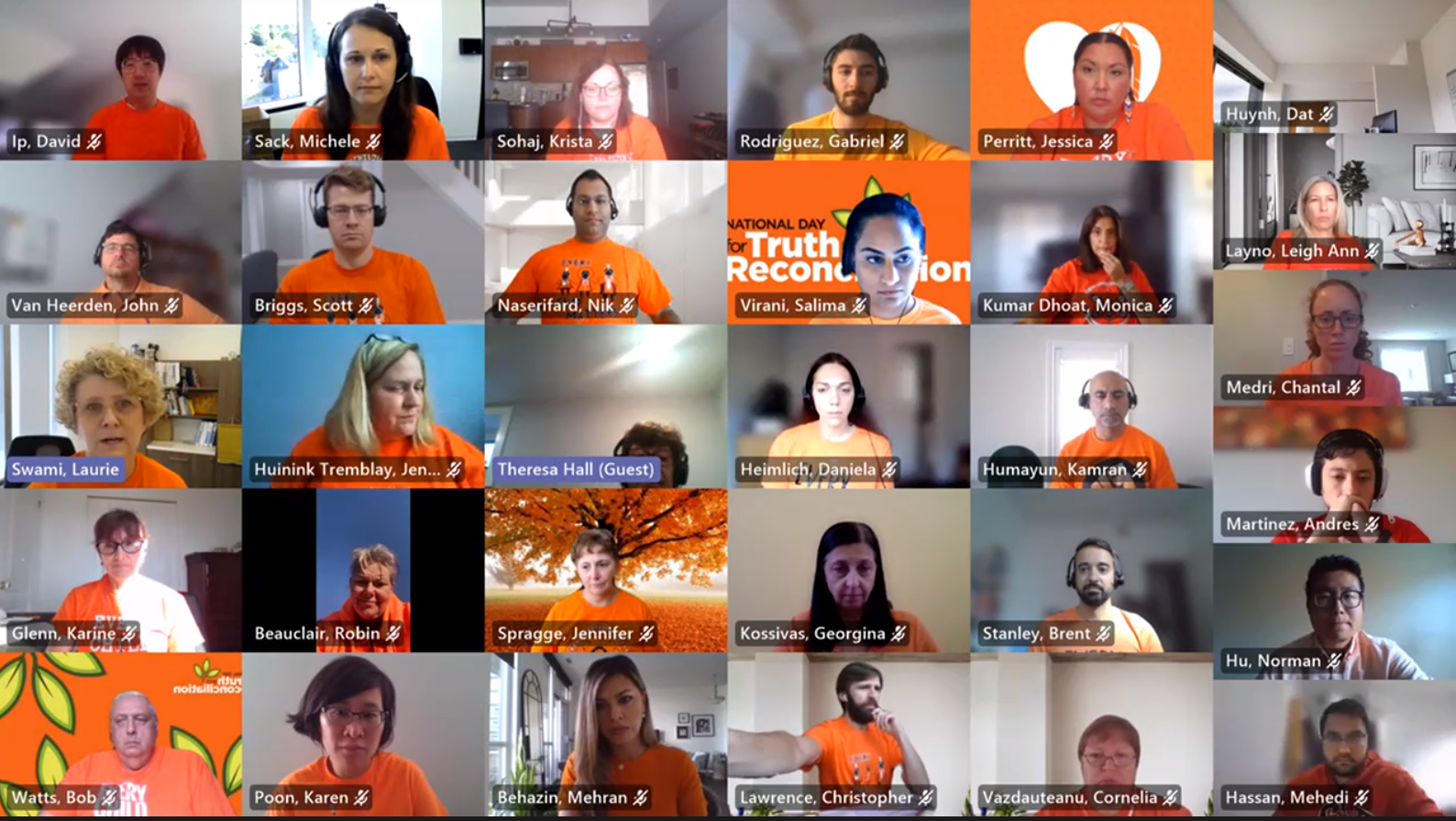This Sept. 30, 2021, is the first official legislated National Day for Truth and Reconciliation in Canada. The Nuclear Waste Management Organization (NWMO) joins Indigenous peoples and Canadians across the country to reflect on the ongoing impacts of residential institutions and their legacy.
The NWMO commemorated the occasion by listening to and honouring a survivor of two residential institutions, Elder Theresa Hall. Elder Hall shared her story with NWMO employees virtually on Sept. 28. Employees in attendance wore their orange Every child matters shirts and listened to Elder Hall’s truths, with open ears, open hearts, open minds, and open spirits.
Born in Attawapiskat First Nation, Elder Hall is a proud Cree woman, and a member of the Council of Elders and Youth (the Council), an independent advisory body to the NWMO. Since joining the Council in 2017, Elder Hall has been instrumental in helping develop the NWMO’s Reconciliation Policy and helping guide the organization’s Reconciliation journey.
“It is important for the NWMO to learn and listen to Elders to ensure we are making meaningful contributions to Reconciliation. If the Elders, like Elder Hall, are supportive of the NWMO’s Reconciliation efforts, it tells me we are on the right track,” said Bob Watts, Vice-President of Indigenous Relations and Strategic Programs at the NWMO.
In her youth, Elder Hall attended two of the very first residential institutions in Canada – the first, St. Anne Residential School of Fort Albany in Ontario, and the other, Fort George Roman Catholic Indian Residential School in Quebec. These schools were home to some of the most disturbing examples of abuse against Indigenous children in Canada.
“I still feel sadness when I recall those days. In the early years before residential schools, we were so happy. There was no alcohol, no drugs. We lived a peaceful life, a balanced life, one among nature,” recalls Elder Hall.
Elder Hall was taken from her home at the age of seven and had to attend a residential institution. She only spoke the Cree language at the time.
“Cree was discouraged to be spoken among us. I didn’t know the English language whatsoever. It was very difficult to try to communicate with anyone, so I remained silent,” said Elder Hall.
If it was not for her sister who was forced to be a young mother figure at only 10 years old, Elder Hall says she would not have survived.
“My sister was my role model. I loved her so much,” said Elder Hall. “At night, she would pull our beds together until she knew I was ready to go to sleep, and then pulled the beds apart once I was sleeping. We never got caught because if we did, we would have been punished.”
Elder Hall also acknowledged the great amount of abuse that she and others at the institution faced such as sexual, physical, verbal, and emotional violence.
While residential institutions have now been shut down, their legacy continues through intergenerational trauma and other discriminatory colonial policies that impact Indigenous children to this day.
The Truth and Reconciliation Commission of Canada’s Calls to Actions and the Calls for Justice of the National Inquiry into Missing and Murdered Women and Girls give us guidance on how to move forward in this journey of truth, justice and Reconciliation.
The NWMO hopes that this will bring about positive change. This day itself, National Day for Truth and Reconciliation, sprung from legislation just passed in 2021.
“It is my duty now to share this [culture, ceremony and language] with my children and grandchildren, and make sure they will always keep our culture and language alive and honour it forever,” says Elder Hall.
The NWMO is committed to our ongoing Reconciliation journey, including advocating to ensure space is created for all Indigenous voices, and to listen to and honour their stories – past, present and future. Most importantly, the NWMO is committed to co-creating a better future based on respectful and reciprocal relationships with Indigenous peoples.
“This is a good time for reflection. It is really important for us to hear Elder Hall’s story as we continue our Reconciliation journey here at the NWMO. We cannot forget the past. We need to take action to support Indigenous communities and have difficult conversations,” said NWMO President and CEO Laurie Swami. “We still have a ways to go, but it takes time, and it is important for us to learn more and educate ourselves on this very important Canadian issue.”
What can you do?
Learn more! Canadians can learn about First Nation, Inuit and Métis peoples. There are several books and resources available. You can also donate to charities that support residential institution survivors and improve the lives of Indigenous peoples.
Together, let us make sure the slogan “Every child matters” come true.

